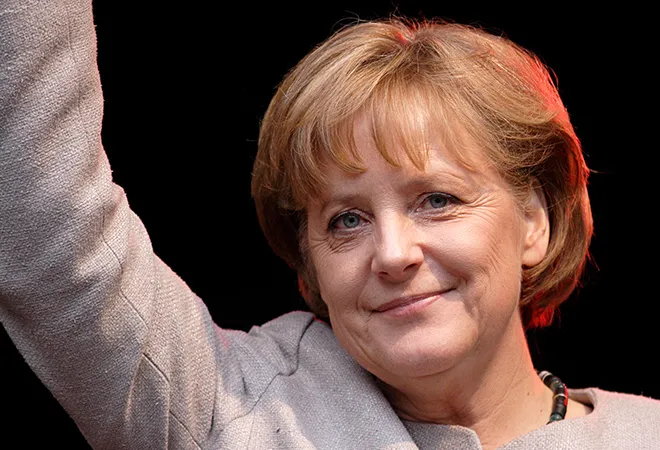-
CENTRES
Progammes & Centres
Location
While Merkel might have, once again, narrowly saved her head in Brussels, the reality is that rightwing populism as a new political force has not only poisoned the political climate on the continent — it has also accelerated the erosion of what was the idea of Europe for a long time.

Image Source: European People’s Party — Flickr/CC BY 2.0
There was a moment earlier this year, when Europe seemed to be back on track. The dynamic French President Emmanuel Macron made all the right noises, Germany — at last — had formed a government with the well-respected chancellor Angela Merkel again in the driver’s seat and even Greece seemed to be limping back to normalcy.
Alas, all rumours about imminent solutions to the many problems that have been tormenting the old continent are greatly exaggerated. While everybody was eager to present success stories at the long-awaited meeting of the European Council on 28 and 29 June in Brussels, the summit rather revealed the faultlines of the EU. While it is commendable that the member states managed to reach some level of understanding in the most pressing issues, namely migration and the reform of the Eurozone, the agreements are vague and represent little more than the smallest common denominator among the 28 member states. What is worse even is the fact that rightwing populism managed to dominate the summit with its anti-immigration agenda.
"All rumours about imminent solutions to the many problems that have been tormenting the old continent are greatly exaggerated."
On refugees, the new compromise consists of a strengthening of the EU’s external border controls and a first crack in the so-called “Dublin system” that confines refugees to the country they first set foot in, which means that countries with long external borders such as Italy have to deal with the largest number of asylum applicants. The creation of so called “disembarkation platforms,” a word as terrible as the idea behind it, is most questionable and smacks of colonialism. The plan is to send refugees on ships back to camps in Africa, where the UN Refugee Agency (UNHCR) should check if they are eligible for asylum in Europe. Countries such as Morocco, Tunisia and Libya have already signaled that they disagree with a plan made without their consultation.
 Today large parts of Eastern Europe, namely Hungary and Poland, are governed by parties with opposite ideas. | Photo: Miguel Discart — Flickr/CC BY-SA 2.0
Today large parts of Eastern Europe, namely Hungary and Poland, are governed by parties with opposite ideas. | Photo: Miguel Discart — Flickr/CC BY-SA 2.0
On the Eurozone, Germany and France had previously agreed in the German town of Meseburg on a few baby steps towards reforms that fall short of all earlier suggestions. “A compromise without ambition that will change nothing,” was the verdict of French economist Thomas Piketty. On financial issues, Europe remains firmly gridlocked between northern countries lead by Germany, that insist on austerity and that are adverse to a full monetary union and Southern countries lead by France, that want a deeper integration and risk-sharing.
Even more revealing than the results of the Brussels-meeting was the run-up to the summit. In Germany, Angela Merkel’s small coalition partner, the Bavarian Christian Democrats (CSU) pushed the government to the brink of collapse over the refugees-question just ahead of the meeting. Although the number of illegal migrants to Europe came down by 95 percent since summer of 2015 when Merkel decided to open the German borders, her Interior Minister Horst Seehofer (CSU) threatened to bring down the government if Merkel did not fall in line with his hardline demands.
Seehofer’s party will face elections later this year in its home state Bavaria and wants to close ranks against the onslaught of the rightwing populist AfD by showing itself tough in immigration. An extremely dangerous strategy. As elections in many European countries show, it is questionable if conservative parties are able to secure their position by becoming more rightwing.
"On refugees, the new compromise consists of a strengthening of the EU’s external border controls and a first crack in the so-called “Dublin system” that confines refugees to the country they first set foot in, which means that countries with long external borders such as Italy have to deal with the largest number of asylum applicants."
While Merkel might have, once again, narrowly saved her head in Brussels, the reality is that rightwing populism as a new political force has not only poisoned the political climate on the continent — it has also accelerated the erosion of what was the idea of Europe for a long time: An open-minded and liberal continent that was moving towards an “ever closer union.”
Today large parts of Eastern Europe, namely Hungary and Poland, are governed by parties with quite the opposite idea. Illiberal nation states bordering on the authoritarian and monocultural with no room for immigration. Earlier in June, the anti-immigration party SDS won the elections in Slovenia. Party leader Janez Jansa echoed Donald Trump with slogans such as “Slovenia and Slovenians first.”
The trend is not confined to Eastern Europe. If Emmanuel Macron should not succeed with his ambitious reform program in France, rightwing populist Marine Le Pen is already hankering for her moment in the sun. Other Western countries such as Austria and the Netherlands have experienced rightwing populist participation in governments, all with the same results: growing xenophobia and waning support for globalisation, free trade and a closer integration of Europe.
Policymakers in Europe have to realise that positions long taken for granted have once again become contested. They will have to fight for the idea of Europe as a process of integrating liberal democratic nation states into one union — a vision that is still as progressive and attractive as it was in the beginning. It needs to take center stage again in the public discourse. Everything else on the table is a relapse into Europe’s own violent history.
The views expressed above belong to the author(s). ORF research and analyses now available on Telegram! Click here to access our curated content — blogs, longforms and interviews.

Britta Petersen is a German journalist and political scientist. She is currently a Senior Fellow at the Observer Research Foundation and works on India-EU relations. ...
Read More +